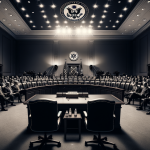Supreme Court clears path for Trump to deport toughest immigration cases

Supreme Court’s Major Victory for President Trump on Deportation Policies
The Supreme Court has recently bolstered President Trump’s authority to deport illegal immigrants to third countries, overriding lower court decisions that had imposed numerous obstacles. This pivotal move was institutionalized through an unsigned order from the justices, which effectively suspended the prior rulings while the legal proceedings continue. This development markedly enhances the administration’s capacity to manage deportations of illegal immigrants whose native countries reject their reentry.
Dissenting Opinions from Democratic Appointees
The order was not without opposition, as the three Democratic appointees on the court voiced their disagreement. They expressed concerns that this decision might expose some deportees to severe injustices, such as torture or death in third countries. Justice Sonia Sotomayor was particularly vocal, labeling the intervention as a “gross” misuse of justice and advocated for a more cautious approach in these critical human rights situations.
Details of the Immigration Case
The central issue involves immigrants who have been mandated for deportation but cannot be returned to their homeland as it refuses to accept them. According to U.S. law, these individuals can then be deported to a third country if a willing nation can be found. The contention arose around the kind of notice and appeals rights these migrants should have before being removed to a third country. In Massachusetts, Judge Brian Murphy, an Obama appointee, ruled in favor of enhanced due process for these individuals, which included detailed written notices and the opportunity to argue against their deportation on safety grounds.
However, the Supreme Court’s latest ruling suspends these new protocols, which had thwarted the Trump administration’s attempt last month to deport various high-level criminal offenders to South Sudan. Judge Murphy had intercepted this deportation plan, demanding more rigorous due process and temporarily redirecting the flight carrying these individuals to a U.S. military base in Djibouti.
Federal Frustrations and Legal Accusations
|
The Trump administration and its officials were publicly and significantly frustrated by these judicial interventions, asserting that such decisions compromise national security, counter-terrorism, and humanitarian missions. Legal representatives for President Trump accused Judge Murphy of overstepping his bounds and imposing standards not stipulated by Congress.
As the migrants remain in a temporary detention facility in Djibouti, waiting to present their cases against deportation to South Sudan, the situation continues to develop. Despite the Supreme Court’s ruling, Judge Murphy noted that it doesn’t directly alter the immediate handling of these specific cases, meaning Homeland Security must proceed with the predefined process.
Reflection on Past Administrative Challenges
This Supreme Court ruling also touches on previous administrative errors, such as the mistaken deportation of a Guatemalan man to Mexico without proper inquiry into his fear of torture, later admitting to a mistake in records. Historically, the Supreme Court has tended to support President Trump’s initiatives to modify or revoke leniency policies from the Biden era concerning illegal immigrants, although it has occasionally shown skepticism towards hasty deportations.
The latest judgment serves as a poignant reminder of ongoing judicial and executive friction, especially with lower court judiciaries under Obama and Biden appointees who have previously attempted to shield illegal immigrants from stringent deportation measures. Justice Sotomayor’s criticisms also highlighted a deeper concern for the potential human cost affiliated with these legal decisions, emphasizing the gravity of weighing legal protocols against human rights considerations.








No Comments